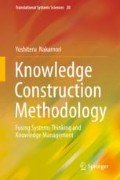Abstract
The knowledge construction methodology consists of a knowledge construction system model, a dialectic knowledge construction method, and a set of knowledge justification principles called constructive objectivism. To emphasize the universality of the knowledge construction system model, this chapter first shows that the model is derived naturally from the new tactics creation method by Yoshiharu Habu, a permanent grand master of Japanese chess. This model suggests that knowledge is created and justified by the five abilities of actors in the four knowledge domains. This chapter introduces an application of the knowledge construction method in detail in the end, so it first explains constructive objectivism. As an application of the knowledge construction methodology, this chapter reports on the creation of stories that promote classroom lessons for a traditional Chinese instrument in Japan.
Access this chapter
Tax calculation will be finalised at checkout
Purchases are for personal use only
Notes
- 1.
Deep learning is a kind of machine learning. It became famous recently because a computer program called AlphaGo strengthened by deep learning defeated the strongest human Go player in 2016.
- 2.
Confucius’s (551 BC–479 BC) disciples gathered and compiled his words in this book after his death. It is one of the “Four Books” in Confucianism. The others are Mengzi, The Great Learning, and The Doctrine of the Mean.
- 3.
Fei Meng, born in Dalian, China, received a Ph.D. in knowledge science from Japan Advanced Institute of Science and Technology. She teaches many Japanese people the performances of the erhu in Kanazawa, Japan.
- 4.
Portamento is a performance technique that moves smoothly and gradually while changing the pitch when moving from one sound to another.
References
Descartes, R. (1637) Discourse on the method of rightly conducting one’s reason and seeking truth in the sciences. (Original language: French.)
Foucault, M. (1972). The order of things: An archeology of human sciences. New York: Routledge.
Habu, Y. (2012). Intuition. Kyoto: PHP SHINSHO. (In Japanese).
Husserl, E. G. A. (1936) The crisis of European sciences and transcendental phenomenology: An introduction to phenomenological philosophy. (1936 in German, 1954 in English), 1970, Evanston: Northwestern University Press.
Kuhn, T. S. (1962). The structure of scientific revolutions. Chicago: Chicago University Press.
Nakamori, Y. (2003). Systems methodology and mathematical models for knowledge management. Journal of Systems Science and Systems Engineering, 12(1), 49–72.
Nakamori, Y. (2013). Knowledge and systems science: Enabling systemic knowledge synthesis. Boca Raton: CRC Press/Taylor & Francis Group.
Nakamori, Y. (Ed.). (2015). Knowledge synthesis: Western and eastern cultural perspectives. Tokyo: Springer.
Nakamori, Y., & Zhu, Z. C. (2004). Exploring a sociologist understanding for the i-system. International Journal of Knowledge and Systems Sciences, 1, 1), 1–1), 8.
Nakamori, Y., Wierzbicki, A. P., & Zhu, Z. C. (2011). A theory of knowledge construction systems. Systems Research and Behavioral Science, 28, 15–39.
Nonaka, I., & Takeuchi, H. (1995). The knowledge-creating company: How Japanese companies create the dynamics of innovation. New York: Oxford University Press.
Nonaka, I., Hirose, A., & Ishi, Y. (2013). Management by knowledge maneuverability: Synthesizing knowledge creation and maneuver warfare. Hitotsubashi Business Review, 61(3), 120–137. Toyo Keizai Inc. (In Japanese).
Polanyi, M. (1958). Personal knowledge: Towards a post-critical philosophy. London: Routledge & Kegan Paul.
Polanyi, M. (1966). The tacit dimension. London: Routledge & Kegan Paul. (University of Chicago Press. 2009 reprint.).
Popper, K. R. (1934). Logik der Forschung. Vienna: Julius Springer Verlag. (Translation: The Logic of Scientific Discovery. New York: Basic Books, 1959.).
Sober, E. (2013). Core questions in philosophy: A text with readings (6th ed.). Boston: Pearson Education.
Wierzbicki, A. P., & Nakamori, Y. (2006). Creative space – Models of creative processes for the knowledge civilization age. Berlin: Springer.
Wierzbicki, A. P., & Nakamori, Y. (Eds.). (2007). Creative environments – Issues of creative support for the knowledge civilization age. Berlin: Springer.
Wierzbicki, A. P., & Nakamori, Y. (2008). The importance of multimedia principle and emergence principle for the knowledge civilization age. Journal of Systems Science and Systems Engineering, 17(3), 297–318.
Author information
Authors and Affiliations
Rights and permissions
Copyright information
© 2020 Springer Nature Singapore Pte Ltd.
About this chapter
Cite this chapter
Nakamori, Y. (2020). Knowledge Construction Methodology. In: Knowledge Construction Methodology. Translational Systems Sciences, vol 20. Springer, Singapore. https://doi.org/10.1007/978-981-13-9887-2_5
Download citation
DOI: https://doi.org/10.1007/978-981-13-9887-2_5
Published:
Publisher Name: Springer, Singapore
Print ISBN: 978-981-13-9886-5
Online ISBN: 978-981-13-9887-2
eBook Packages: Business and ManagementBusiness and Management (R0)

